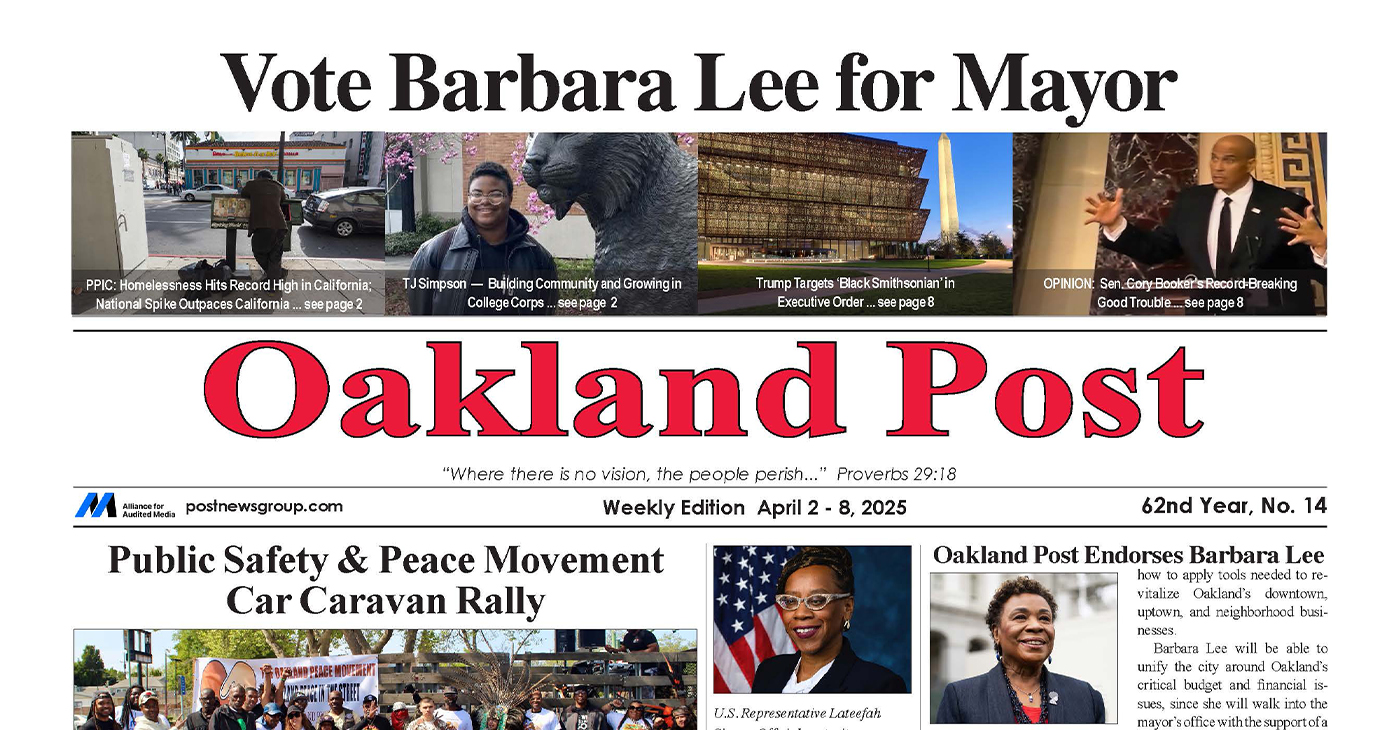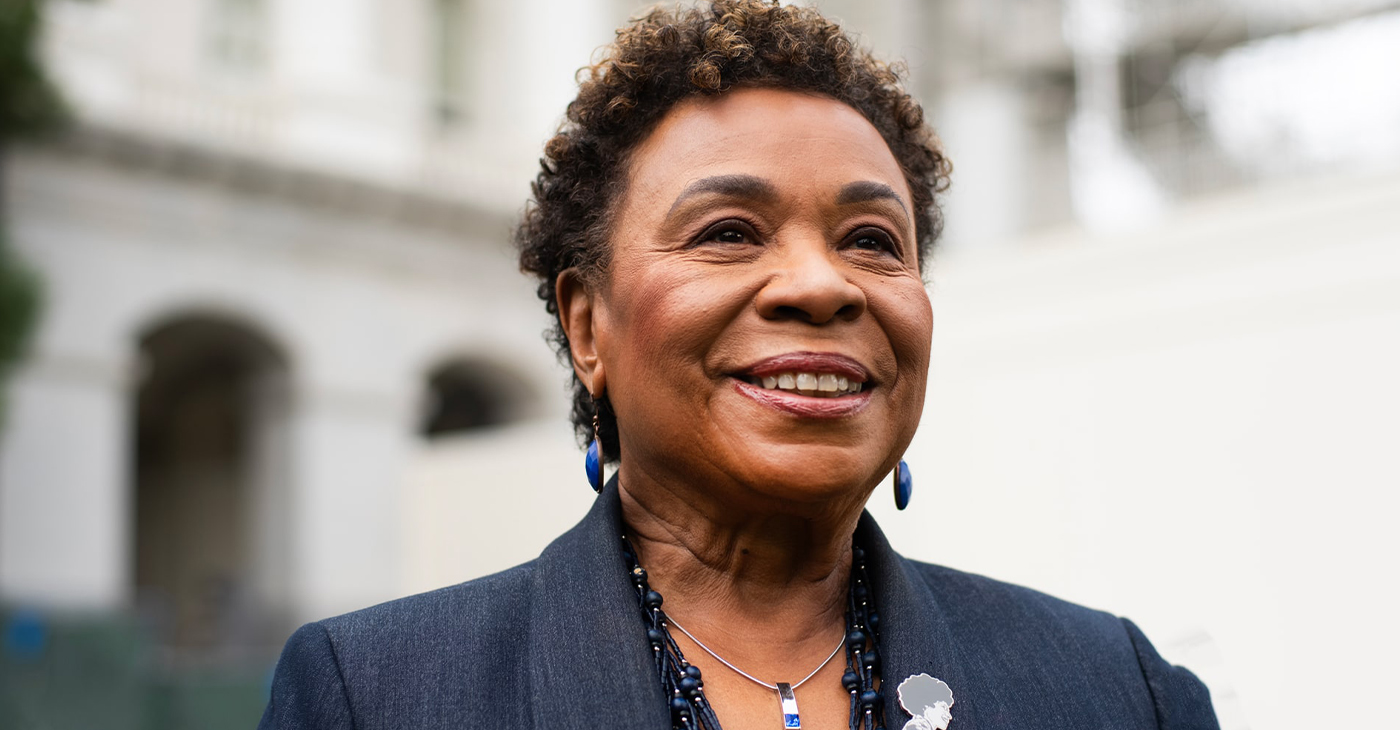City Government
OPINION: Black, Unhoused and Mentally Challenged: The Case for Housing and Health Care
Numerous studies have confirmed that homelessness and behavioral and mental health problems affect African Americans at disproportionate rates in California and around the United States.

By Dr. Lenore A. Tate
Special to California Black Media Partners
Numerous studies have confirmed that homelessness and behavioral and mental health problems affect African Americans at disproportionate rates in California and around the United States.
On a very primary and personal level, homelessness affects an individual’s mental health. Looking at the data: approximately 30% of people who are chronically unhoused have a mental health condition, about 50% have a co-occurring substance use problem and 42% have a disabling condition such as a developmental disability, HIV/AIDS or injuries from combat such as post-traumatic stress disorder.
In California, 43% of the Black Californians interviewed reported that someone close to them has experienced homelessness — a rate much higher than any other racial group in the survey, according to a survey conducted by the California Health Care Foundation.
Black women in particular are at a higher risk for exposure to mental health stresses.
“A variety of circumstances put Black women at high risk for mental and emotional stress — economic insecurity, responsibilities of caregiving, neighborhood violence, lack of social support and physical illness or disability,” reads the website of the California Black Women’s Health Project.
“As a result, many are plagued by tension, anxiety, worry and fear. Because of the powerful and complex links between the mind, emotions and body, chronic states of stress and anxiety can have dangerous and sometime fatal, health consequences. In addition, the daily struggles of coping with racism and sexism further exacerbate mental and emotional stress,” the write-up on the website reports.
When these intersecting issues go unaddressed, they can compound and adversely affect individuals.
Black people make up 13.6% of the population in the United States and account for approximately 21% of those living in poverty. Blacks in California comprise 6.5% of the population but are more than 40% of the homeless/unhoused population!
In fact, in most shelters, food banks, drop-in centers for the unhoused, the majority of those served are from Black or Brown communities. Black people outnumber white people 12 to 1 among the homeless population.
California has more unhoused people than any other state. Seventy percent of California’s homeless are living on the streets and in tents, etc. while in New York, data reflects that only 5% of their homeless are living on the streets.
California has instituted several policies and passed a series of laws to address the mental health and homeless crises.
Last year, during his annual budget proposal, Gov. Gavin Newsom connected the challenge of solving homelessness in the state with inadequate approaches the state has taken so far to address mental health.
Among different approaches taken to address the state’s mental health challenges and, consequently, the homelessness crisis is the passage of the Community Assistance, Recovery and Empowerment Act (CARE) Act last year. This law, which Newsom signed into law, establishes CARE Court, an alternative to the Criminal Justice System for people who are mentally ill.
But more needs to be done if we are to address the monumental challenges of our mental health and homelessness crises, particularly as it affects minorities. The resources and programs the state has made available have simply not kept up with the demand for services.
California was the first state in the country to propose housing as a human right under Assembly Constitutional Amendment 10 (ACA-10) (Bonta 2020).
This amendment would ensure shelter for the unhoused and recognize that housing as a human right. However, after more than 70 years, housing still appears to be treated as a commodity rather than a human right.
Across the board — from prevention and early intervention to strategically providing housing and chronic care — we need to do more in the Golden State.
Medical professionals need to be provided cultural sensitivity training and more needs to be done to destigmatize mental health care in the Black community.
Social support systems must be strengthened, and more resources need to be committed to outreach and research so that both care and information can be targeted to serve the needs of Black Californians.
We need a combination of solutions working at the policy level, within the health care delivery system and among our social and community networks that attack the problems from various angles.
Committing to funding, decreasing hurdles in zoning, working collaboratively with public and private sectors, and creating space for ingenuity would be steps toward solving these crises.
Recognizing that Black and Brown communities, children, families and seniors are unhoused as well as those that carry the weight of mental illness, leads us to act and consider prioritizing vulnerable populations of unhoused.
We must utilize all our available resources so that every Californian will be afforded the right to have housing and a ‘home’ and adequate mental health care, allowing for security, safety and comfort.
About the Author
Lenore A. Tate, Ph.D. is a licensed psychologist in private practice in Sacramento. She has previously worked as principal consultant to the California Assembly and Senate Health Committees as well as the Senate Office of Research. Dr. Tate has also served as a university professor in Texas, Arizona and California. She specializes in neuropsychology, geriatrics and behavioral health.
California Black Media’s coverage of mental health in Black communities is made possible with the support of the California Health Care Foundation.
Activism
Oakland Post: Week of April 2 – 8, 2025
The printed Weekly Edition of the Oakland Post: Week of April 2 – 8, 2025

To enlarge your view of this issue, use the slider, magnifying glass icon or full page icon in the lower right corner of the browser window.
Activism
Oakland Post Endorses Barbara Lee
Barbara Lee will be able to unify the city around Oakland’s critical budget and financial issues, since she will walk into the mayor’s office with the support of a super majority of seven city council members — enabling her to achieve much-needed consensus on moving Oakland into a successful future.

As we end the celebration of Women’s History Month in Oakland, we endorse Barbara Lee, a woman of demonstrated historical significance. In our opinion, she has the best chance of uniting the city and achieving our needs for affordable housing, public safety, and fiscal accountability.
As a former small business owner, Barbara Lee understands how to apply tools needed to revitalize Oakland’s downtown, uptown, and neighborhood businesses.
Barbara Lee will be able to unify the city around Oakland’s critical budget and financial issues, since she will walk into the mayor’s office with the support of a super majority of seven city council members — enabling her to achieve much-needed consensus on moving Oakland into a successful future.
It is notable that many of those who fought politically on both sides of the recent recall election battles have now laid down their weapons and become brothers and sisters in support of Barbara Lee. The Oakland Post is pleased to join them.
Activism
Oakland Post: Week of March 28 – April 1, 2025
The printed Weekly Edition of the Oakland Post: Week of March 28 – April 1, 2025

To enlarge your view of this issue, use the slider, magnifying glass icon or full page icon in the lower right corner of the browser window.
-

 Activism2 weeks ago
Activism2 weeks agoWe Fought on Opposite Sides of the Sheng Thao Recall. Here’s Why We’re Uniting Behind Barbara Lee for Oakland Mayor
-

 #NNPA BlackPress3 weeks ago
#NNPA BlackPress3 weeks agoRev. Dr. Jamal Bryant’s Black Church Target Boycott Mobilizes 150,000
-

 Activism3 weeks ago
Activism3 weeks agoSan Francisco Is Investing Millions to Address Food Insecurity. Is Oakland Doing the Same?
-

 #NNPA BlackPress2 weeks ago
#NNPA BlackPress2 weeks agoRecently Approved Budget Plan Favors Wealthy, Slashes Aid to Low-Income Americans
-

 Activism2 weeks ago
Activism2 weeks agoFaith Leaders Back Barbara Lee for Mayor, Criticize Candidate Loren Taylor for Dishonest Campaigning
-

 Activism3 weeks ago
Activism3 weeks agoOakland Post: Week of March 12 – 18, 2025
-

 Activism2 weeks ago
Activism2 weeks agoGroup Takes First Steps to Recall District Attorney Diana Becton
-

 #NNPA BlackPress3 weeks ago
#NNPA BlackPress3 weeks agoPRESS ROOM: The Urban One Podcast Network Announces Los Angeles Wildfires Podcast, ‘Altadena: After the Fire’





















































